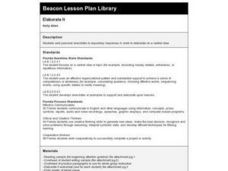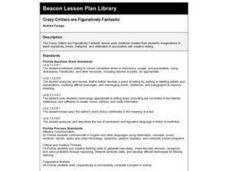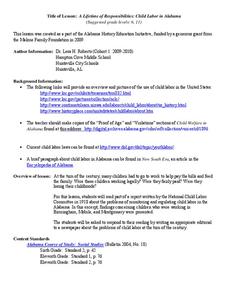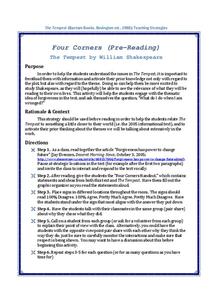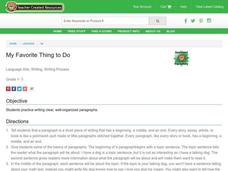Curated OER
Workplace Vocabulary
High schoolers engage in daily spelling and vocabulary practice of workplace-related terms with definition matching exercises, word scrambles, dictation, sentence writing. Finally, they compose a short essay in which they use the words...
Curated OER
Elaborate It
Students read writing samples and discuss the differences between the writing with and without anecdotal examples. They write expository essays that include personal anecdotes.
Curated OER
Create Your Island Paradise
Sixth graders create a descriptive essay and map describing their island paradise. They try to evoke the reader's senses: seeing, hearing, touching, smelling, and tasting. They revise their paragraphs using their partner's feedback.
Curated OER
Monster Voices
Young scholars create stories based upon the techniques of author Maurice Sendak in Where the Wild Things Are. They use a word processing program and the Apple software program GarageBand to create new voices for the...
Curated OER
Voice Trait: Who Is Talking?
Learners recognize the difficulty of knowing who wrote a letter from the envelope. In this writing "voice" lesson, students understand the meaning of voice in writing and detect who the writers are in a worksheet.
Curated OER
Delicious Descriptive Adjectives
Students write out recipes with different adjectives then share them with the class.
Curated OER
Nine Planets
What are characteristics of a planet? With this plan, learners investigate the characteristics of the planets in our solar system. They gather research of the nine planets by using the Internet and other research tools. Then they create...
Curated OER
How Logical is Garfield?
Third graders analyze comics found in the newspaper for samples of logical, emotional, and ethical appeal. They write a paragraph for each selected comic strip explaining how the comic strip represents the use of logic, emotions, or ethics.
Curated OER
Crazy Critters are Figuratively Fantastic
Eighth graders use creatures created from their imaginations to practice hyperbole, simile, metaphor, and alliteration in association with creative writing. They utilize a worksheet imbedded in this plan to guide their writing.
Curated OER
Luscious Language Boxes
Young scholars experience a writing activity aimed at spicing up their writing. They use the classroom Luscious Language Box to add creative parts of speech to their writing.
Curated OER
Could You Elaborate on That?
Fourth graders engage in a lesson plan which teaches the parts of an expository essay and how to organize and write an expository piece from a given topic. After a lecture/demo, 4th graders utilize a worksheet imbedded in this plan which...
Curated OER
Who Has the Power?
Fifth graders write persuasive letters expressing opinions about the purchase of 25 acres adjacent to Wakulla Springs proposed to include a convenience store/gas station. They submit the letter to the Florida Department of Environmental...
Museum of Tolerance
Artifact Research Activity
Artifacts give us the privilege of learning about the past, may it be family, culture, or traditions. Here, class members learn about their family's past with the help of an artifact, or family heirloom. Once an artifact is...
Curated OER
Survivor Suitcases
Pupils analyze and discuss how they would prepare for a trip to a desert island. They write a paragraph explaining why they chose their three items and how each help them to survive.
Alabama Department of Archives and History
A Lifetime of Responsibilities: Child Labor in Alabama
Imagine children working long hours in factories, coal mines, and in the fields. Class members examine a series of pictures and read about early attempts to regulate child labor and current child labor laws.
Curated OER
Growth of a Nation: Trading Cards
Students research and write about events and people that have contributed to the development of Canada. They develop their paragraphing skills and create a package of 10 Canadian History Trading Cards.
Manchester College
What’s Your Point of View?
Work on deciphering the point of view of various pieces of literature. As readers review the concepts of first, second, and third person perspective, they apply what they know to different passages.
Novelinks
The Little Prince: Anticipation Guide
Begin your unit on Antoine de Saint-Exupéry's The Little Prince with an anticipation guide that addresses the novel's themes. Kids read ten statements that discuss love, friendship, and growing up, and determine whether or not...
Bantam Books
The Tempest: Four Corners
Forgiveness can be a difficult step to take in any circumstance, but is it more difficult if the offense is more egregious? High schoolers consider the concept of forgiveness before reading William Shakespeare's The Tempest. As...
Curated OER
Antagonist
Young learners explore the antagonist. They retell Hansel and Gretel and identify the witch and the stepmother as antagonists. They then brainstorm common character traits of an antagonist, and then write a paragraph describing...
Newseum
Journalists Code of Ethics
Journalists are supposed to adhere to a Code of Ethics. To determine the degree to which reporters follow this code, individuals select three recent stories with photographs from newspapers, magazines, online news sites, or television...
Curated OER
My Favorite Thing to Do
Pupils realize that a paragraph is a short piece of writing that has a beginning, a middle, and an end. Every story, essay, article, or book is like a patchwork quilt made of little paragraphs stitched together
Curated OER
Multimedia Valentine's Card
Third graders create a Valentine's card stack for a special person of their choice. They write a clear and coherent sentences and paragraphs that create a central idea. Students use the computer to create a HyperStudio two card stack....

